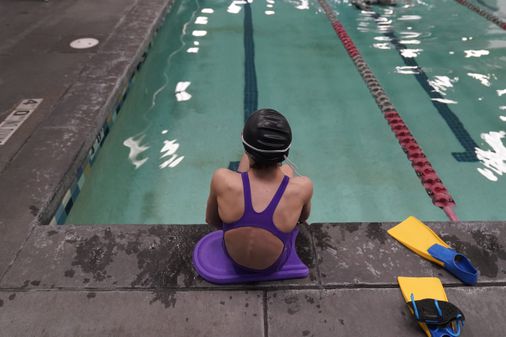
The bigger, taller person carries the smaller, shorter person for a brief period of time until she falls to the floor while fighting for the game.
That portion of the video clip, which was posted on X, has become a hot button in the controversy over transgender involvement in children’s activities. What transpired next even caught my attention. The larger, taller player makes a second attempt to help the person on the floor by extending her hand, but she disengages from the extended hand. The gap between the two sides on yet another cultural battleground, in this case, a sports court, is perfectly illustrated.
Riley Gaines, a former collegiate swimmer who opposes the participation of transgender athletes in children’s activities, posted a video clip that appears to show an injury. According to reports, the person was the third person to get hurt during a match between Collegiate Charter School of Lowell and KIPP Academy Lynn. A Collegiate director told the Globe after people said “they feared getting injured and not being able to compete in the finals” that they had to leave the game at that time.
Is it possible to discuss this without coming off as misogynistic and right-wing? There ought to be, just as there ought to be a way to defend the rights of transgender sports without being accused of sacrificing safety and fair play on the altar of left-wing political correctness. Proponents of transgender rights contend that inflated events like those allegedly depicted in the video clip are used to stoke fear. It would be wonderful to hear some reliable information from the Massachusetts Interscholastic Athletic Association regarding transgender athletes’ injuries as well as information on how transgender athletes affect competition overall. Instead, information mostly enters the public through transgender athletes’ competitors, who use it to stoke fear.
The language on the other side can become heated, as Carol Rose of the ACLU of Massachusetts claims that the discussion surrounding the videotape is “part of a planned attempt globally to try to eliminate LGBTQ people from public existence.” I have a lot of respect for Rose and the ACLU. Parents who are simply trying to understand what it means to have a transgender woman compete against their daughters do a disservice by making such broad generalizations.
Anyone who has ever watched or participated in high school sports is aware that there is always someone who is bigger, stronger, better, and more obviously talented on the field of play. Coming to terms with that as a competitor is a part of life. However, it’s more difficult to reconcile it with the foundation if the bigger, stronger, better, and more talented swimmer was born male and is now competing against female athletes, and if injuries are a concern. Instead of attempting to discredit youth sports as a minor problem of bigots, that requires honesty about how to make it safer for everyone.
Whether or not trans athletes are allowed to choose whether to join male or female teams is changing in public opinion. According to a Gallup poll conducted in June, 69 percent of Americans who responded said athletes should only be allowed to play for teams that correspond to their sex assigned at birth, up 7 points from the same proportion in 2021. According to that recent Gallup poll, 48% of Democrats, 67% of independents, and 93% of Republicans all agree. The Gallup poll found that “political liberals are the lone major subgroup with a majority (57%) support for allowing transgender athletes to choose which team to play on.” Additionally, those poll results revealed that younger people are more sympathetic than older people when it comes to giving athletes the option to choose their preferred team to play for, which is a positive and useful development.
The MIAA book states that a “student may not be excluded from participation on a gender-specific sports team that is consistent with the child’s bona fide gender identity” in this politically liberal state. In reality, the MIAA relies on the district’s person’s neighborhood to determine a student’s gender rather than making separate gender decisions. Trans students are therefore eligible to play for Massachusetts teams based on their gender identity. While everyone else tries to disregard any given discussion, right-wing internet outlets rely on isolated victories by trans athletes or on injuries apparently connected to them.
What does the MIAA have to say about any of this? Not much has been said thus far. In a statement released by the Boston Herald, the MIAA announced that it had been informed of an incident at a women’s basketball game between KIPP Academy Lynn Collegiate. The MIAA continues to be a resource for its member schools as they learn about the details at the local level.
The student swimmer on the floor and the one with the extended hand are both owed far more than that.
The Globe columnist Joan Vennochi is. She can be reached at [email protected]. Follow her on Twitter at @joan_vennochi.



